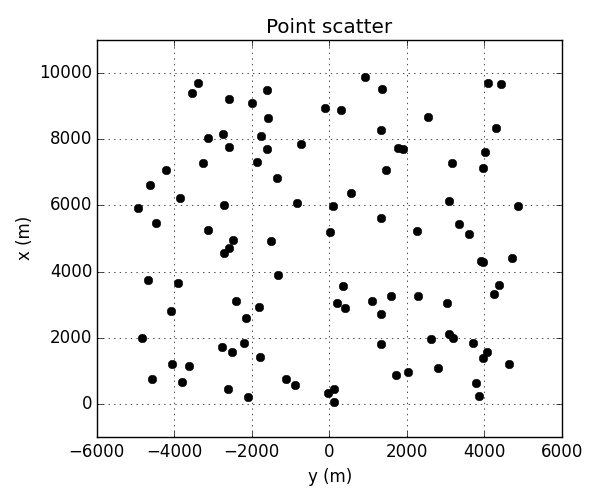You can create the (x, y, z) coordinate arrays for a random scatter of points
using fatiando.gridder.scatter.

Out:
x = [ 3745.40118847 9507.1430641 7319.93941811 5986.58484197 1560.18640442
1559.94520336 580.83612168 8661.76145775 6011.15011743 7080.72577796
205.84494296 9699.09852162 8324.426408 2123.39110678 1818.24967207
1834.04509853 3042.4224296 5247.56431632 4319.45018642 2912.29140198
6118.52894722 1394.93860652 2921.44648535 3663.61843294 4560.69984217
7851.75961393 1996.73782158 5142.34438414 5924.14568862 464.5041272
6075.44851901 1705.24123687 650.51592985 9488.85537253 9656.32033075
8083.97348116 3046.13769173 976.72114006 6842.33026512 4401.5249374
1220.38234845 4951.76910111 343.88521115 9093.20402079 2587.799816
6625.22284354 3117.11076089 5200.68021178 5467.10279343 1848.54455526
9695.84627765 7751.32823361 9394.98941564 8948.27350428 5978.99978811
9218.74235023 884.92502052 1959.82862419 452.27288911 3253.30330763
3886.77289689 2713.49031774 8287.37509152 3567.53326694 2809.34509687
5426.96083158 1409.24224975 8021.96980754 745.5064368 9868.86936601
7722.44769297 1987.15681534 55.22117124 8154.61428455 7068.57343848
7290.07168041 7712.70346686 740.44651734 3584.65728544 1158.69059525
8631.03425876 6232.98126828 3308.98024853 635.58350286 3109.82321716
3251.83322027 7296.06178338 6375.57471355 8872.12742576 4722.14925162
1195.94245938 7132.44787223 7607.85048617 5612.77197569 7709.67179955
4937.95596364 5227.32829382 4275.41018359 254.19126744 1078.91426993]
y = [-4685.70814313 1364.10411264 -1856.44018924 85.70691165 4075.66473926
-2507.07770851 -896.17076964 2555.51138543 -2712.01834508 -4230.20090171
-2102.48547086 -3387.78712746 4296.97652343 3081.20379564 1334.0375651
3714.60590188 3036.72076899 -3134.29941114 3925.5899849 393.42241916
3074.40155164 3960.91299923 -1819.96525028 -3899.48075472 -2720.64837458
-728.92211374 3180.14765922 3607.30583256 -4930.47869469 107.47302578
-825.88996851 -2778.92189529 -3801.34632666 -1623.84828596 4429.09703913
-1767.97067979 187.90621743 2030.18958895 -1363.70397621 4717.82082721
4624.47294942 -2482.17704175 -27.51494108 -1991.21690183 -2151.59505623
-4631.13052645 1095.6433398 26.79023229 -4485.2124875 -2213.53535763
4082.65885967 -2604.38109333 -3551.05127909 -105.47239722 4856.50454111
-2579.44728488 1721.35547406 2616.19615329 -2623.62456008 2282.16348612
-1322.16867281 1323.05830594 1335.29710761 357.74684075 -4097.10229946
3353.02495589 -1792.19935028 -3134.814896 -4592.24858445 908.92943188
1775.64361842 -4834.12171072 120.93058299 -2735.04224802 1451.72790409
-3256.33570995 1909.37738102 -1132.64653699 4367.29988737 -3624.79055854
-1589.3364895 -3865.26478759 4246.93618279 3773.39353381 -2420.58372285
1599.84046034 3172.22200201 552.00811599 296.50578356 -2581.477091
-4068.97232194 3972.15757953 4004.18057163 1331.01457273 -1609.70208951
-1507.90425387 2259.5567887 3971.10259953 3870.86424265 2798.75545858]
z = [-150. -150. -150. -150. -150. -150. -150. -150. -150. -150. -150. -150.
-150. -150. -150. -150. -150. -150. -150. -150. -150. -150. -150. -150.
-150. -150. -150. -150. -150. -150. -150. -150. -150. -150. -150. -150.
-150. -150. -150. -150. -150. -150. -150. -150. -150. -150. -150. -150.
-150. -150. -150. -150. -150. -150. -150. -150. -150. -150. -150. -150.
-150. -150. -150. -150. -150. -150. -150. -150. -150. -150. -150. -150.
-150. -150. -150. -150. -150. -150. -150. -150. -150. -150. -150. -150.
-150. -150. -150. -150. -150. -150. -150. -150. -150. -150. -150. -150.
-150. -150. -150. -150.]
from __future__ import print_function
from fatiando import gridder
import matplotlib.pyplot as plt
# Define the area where the points are generated in meters: [x1, x2, y1, y2]
area = [0, 10e3, -5e3, 5e3]
# The point scatter is generated from a uniform random distribution.
# So running the scatter function twice will produce different results.
# You can control this by passing a fixed seed value for the random number
# generator.
x, y = gridder.scatter(area, n=100, seed=42)
# x and y are 1d arrays with the coordinates of each point
print('x =', x)
print('y =', y)
# Optionally, you can generate a 3rd array with constant z values
# (remember that z is positive downward).
x, y, z = gridder.scatter(area, n=100, z=-150, seed=42)
print('z =', z)
plt.figure(figsize=(6, 5))
plt.title('Point scatter')
# In Fatiando, x is North and y is East.
# So we should plot x in the vertical axis and y in horizontal.
plt.plot(y, x, 'ok')
plt.xlabel('y (m)')
plt.ylabel('x (m)')
plt.xlim(-6e3, 6e3)
plt.ylim(-1e3, 11e3)
plt.grid(True)
plt.tight_layout()
plt.show()
Total running time of the script: ( 0 minutes 0.075 seconds)